

|
Back to |
| The Front Page |
| People |
|
13-year-old Blake Fields is the USCA's new wunderkind |
||||||
|
by Bob Alman photos courtesy of the USCA and Justin Fields posted on November 12, 2020
|
||||||
|
||||||
Blake Fields was just eleven yours old when he won the doubles Championship Flight of the 2018 USCA Golf Croquet Nationals in West Palm Beach with his partner, 57-year-old Sherif Abdewahab, and was a finalist against him for the top trophies. His parents happen to live next to the croquet courts at Mission Hills Country Club in the Palm Springs area. When Blake was seven, watching the action with a patient curiosity unusual for a child, he caught the eye of their croquet pro at the time, Ben Rothman, currently the the top-ranked player in the US. Rothman invited Blake to give it a try. Which he did. "I started winning when I was nine, and that's when I thought, "This is the game for me!" Blake represented the USCA in the 2019 U-21 World Championship in England, witnessed the World's later with his family, then visited Dublin. Croquet has become the focus of his family's travels.
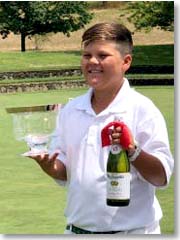
|
| In the USCA Golf Croquet Regionals at California's Sonoma-Cutrer Winery, 11-year-old Blake Fields took second to national champion Ben Rothman. The winery substituted sparking cider for the bottle of wine usually presented to a winner. |
New Zealand turns out a stream of gifted teens from their spectacularly successful and well-managed national program in the schools.
In England, a development program for juniors and greater and better media exposure for the sport helped to produce an entire generation of champions who are still winning in their 40s and 50s.
But in America, all the very rare species of wunderkinder come from croquet-playing families: including highly-ranked and still-improving Matthew Essick, who just turned 20, and Jacques Fournier, who learned to play on his father's court in Phoenix and won a world championship in the 90's. So it's long past time for America to produce another croquet prodigy. I hoped to find out from Blake what they all have in common when I contacted him by email:
Bob Alman: Let's talk a little about your hitting style. You have a very upright posture, and your swing looks very Egyptian to me.
Blake Fields: I have always played a Solomon grip and stand very upright in the swing. I would call the swing a Longcast Pendulum.
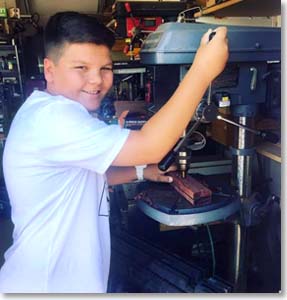
|
| The maker of the Morford mallet happens to live and play at Mission Hills. He has made and adjusted Blake's mallets for the last five years. The mallet has a twelve-inch adjustable head - the virtual limit for top-level players. |
Blake Fields: A Morford . Bob Morford is a member here at Mission Hills. He's become like a family member to us and has modified and made adjustments and built heads and shafts for me as I have grown, since I was seven.
Bob: I've noticed you have a twelve-inch head.
Blake: It's the signature series head, 12 inches in length with doubled up brass face plates. The shaft is made of carbon fiber and all one piece with little or no flex, all of which I love. I don't like flex in a shaft, and the shaft is 36 inches in length.
Bob: With all those specific preferences, you must worry about losing or damaging your mallet.
Blake: He made me an exact replica to have when we travel. But I continually play this one mallet. Nothing feels quite the same as this mallet and the head is solid with great feel at the same time.
Bob: I've been impressed to learn that you play not only Golf Croquet, but also Association Croquet.
Blake: Yes, and I've won tournaments in both. The first AC trophy I won was the First Flight in the US Open here at Mission Hills last year.
Bob: But no American Rules. Why not?
Blake: Right now I'm concentrating on advancing my skills in AC and improving in all my shots. I will play American Rules down the road, but right now I really need to master the strategy and tactics of AC, and continue to work on my Golf Croquet shots.
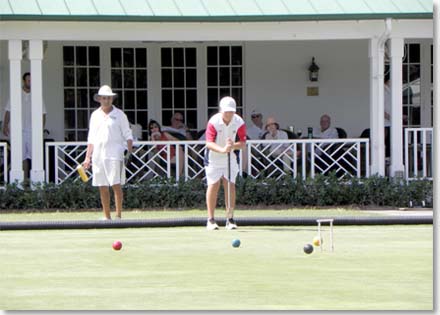
|
| Blake plays a clearing shot in front of the gallery on the veranda of the National Croquet Center. |
Bob: You know that veterans of the sport are very worried that Golf Croquet is going to take over the sport entirely - which seems to be the case with the New Zealand kids in their development program. And the Egyptians in the Under Twenty-One championship aren't interested in anything but Golf Croquet, of course. What you say will be encouraging to the veteran players depressed about the demise of Association Croquet at club level. How do you explain it?
Blake: Living right next to the courts, I've watched a lot of games, and when I met Ben Rothman, he showed me sequence and I seem to have the ability to sit and watch and absorb. I'm in the club here and I tune into everything they do.
Bob: And it's a big club. The croquet pundits explain the spectacular rise of Golf Croquet by saying that everyone - especially youth - is tuned into social media and don't have time for long, complicated games. That doesn't seem to fit your case.
Blake: Social media has made all the difference, in my case. The Internet and social media are great because of the time differences and the postings of videos to watch other great players and to see different tactics and capabilities. I am in contact with players from Egypt, New Zealand, Australia, England, and Spain. I like following what they're doing, we trade scores and tournament results. It's nice when they reach out to me or send a pic of a trophy they just won because it shows me they look at me as an equal and notable player.
Bob: You were the youngest player at the Under-Twenty-One World Championship in England last year, were you not?
Blake: Yes, and the friends made at the U21 Worlds was awesome!!! We were all there to WIN but at the same time it is nice when players get together from all over the world with the common bond of a unique sport they all play. There are jokes made about poor shots and clapping for great shots and wins but also after a tough loss players would talk to other players, including myself, to pep them up.
Bob: You didn't know most of them, did you, before the event?
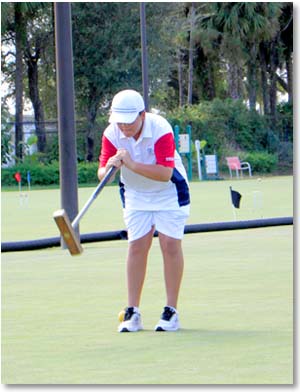
|
| Blake uses a Solomon grip with a swing that begins as far back as possible to help ensure accuracy as well as velocity. |
Bob: Which makes me think that the people who blame the internet and social media for keeping young people away from croquet are missing the benefits of that connection - which you wouldn't have had at all just a generation ago. You all know each other, directly, even though you have never met. And there's no trash talking. And you all want to WIN. And you know, surely, that not everyone can win. I think I get it, but let's just pretend that I don't.
Blake: I believe every time I step onto the court that I can win and never really question or think about defeat. I am very competitive and love to WIN. It's an exceptional feeling and why I hit so many balls and pretty much practice every day or every other day depending on school work.
Bob: That sounds kind of insane, but I think I remember feeling something like that - when I was still winning big games myself, 40 years ago! And I also will never forget the games I SHOULD have won, but didn't because I let my attention lapse for a second or two, and it proved to be fatal. Those I can never forget, I think of them in the middle of the night, still.
Blake: I learned a couple of years ago at the Golf Croquet Nationals after losing a game that I had complete control over - and it would've been a monstrous win - to shake hands quickly, take a deep breath and go for a walk by myself to clear my head and not be a poor sport or show bad emotions. My father and mother have really helped in that for years now. It really works to just walk in silence or go off court somewhere alone and simmer down.
Bob: You've learned a lot from your mentors as well. Who are they?
Blake: Ben Rothman, Mohammad Kamal (Uncle Kimo), Sherif Abdelwahab, Matthew Essick and Robert Fletcher.
Bob: Yes, Ben first noticed you. What about Mohammad?
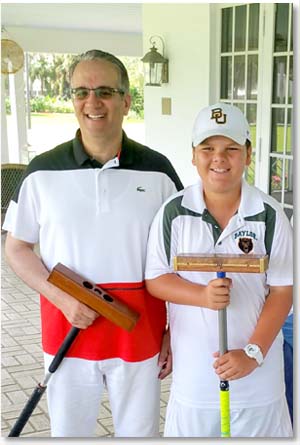
|
| Dr. Mohammad Kamal, who plays at the Pasadena Croquet Club, is Blake's long-time mentor and one of the highest ranked Egyptian-Americans in the sport. |
Bob: I think I should ask more about how you have advanced in Golf Croquet, or what you've learned that has made a difference, but I'm not sure I would understand it. Give it a try, please.
Blake: My Golf Croquet style is sort of like the Modern Egyptian Style. Because my biggest two mentors, Uncle Kimo [top-ranked player Dr. Mohammed Kamal] and Sherif both play an American/Egyptian style that I caught onto when I was younger. My game is a little similar because I hit clears and my hoop shots with pace, and I hit my short jump shots Egyptian-Style as well! I also have some touch that I use in my play because I have been taught that when you are on odd hoops you should try to control the ball down to the next! I also practice a shot called a 'soft safety clear.' That is when you are clearing a ball, you hit it slowly intending to hit their ball out of position and still leave your ball in the mix! That is my style of play!
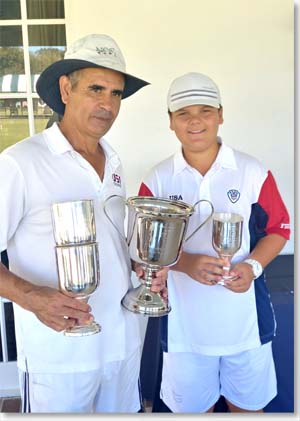
|
| Sherif Abdelwahab is one of Blake's favorite partners in competition. "He expects me to bring my A game when we play as partners or opponents," according to Blake. In the 2018 nationals at Lake Toxaway in North Carolina, they won in doubles and played against each other in singles, with Sherif winning the top trophy. They were again in the singles finals in 2019 at the National Croquet Center, and Sherif's bigger trophy shows that he won again. |
Blake: Clearing is a term, yes, of striking an opponent's ball with your ball to take them out of the offensive position or in some cases depending on sequence and strategy you can hit an opponent's ball that is not quite in scoring position yet depending if you are currently controlling that hoop. The reason I say that is occasionally when you have both your balls that are in scoring position you may choose to hit your opponent's ball that is not even playing the next shot in order to get your ball towards the next hoop. basically making them hit that next shot cleanly; otherwise if they miss or graze their next shot and you run the hoop your ball remains onsides because you hit the opponent's ball. These are rare but great when you can do it.
Bob: I'll have to explain to non-players that when you hit an opponent ball, you gain the privilege of advancing into an otherwise "forbidden" zone that gives you an advantage for the next hoop. You would avoid having to lift your ball to a remote "penalty spot" to play your next stroke. What about pace?
Blake: In the pace you have to pay attention at certain angles because if you miss the result can be an offside. Also in the pace you may clear a ball slightly slower, leaving you in offensive scoring position but placing the opponent wired/blocked by the hoop so they are not able to come back and hit your ball. Then there is the fastball clear, trying to take your opponent's ball to the furthest boundary line of the court so they will have the longest shot possible and have to come all the way down / back at your ball and if you run the hoop they could be in a place to set up for the next hoop after you score it. The faster pace clears can also have your ball after hitting opponent's slam off of it and roll towards the next hoop you will be playing and still be onsides as well.
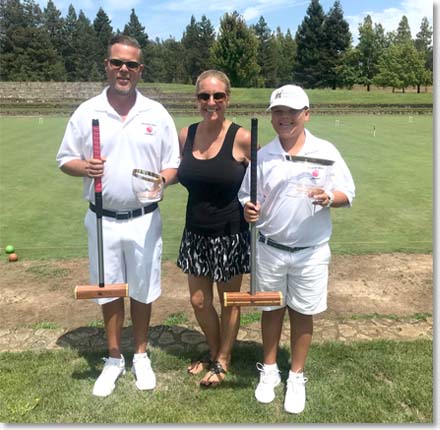
|
| The Fields family display their trophies won at Sonoma-Cutrer Winery in last year's USCA Golf Croquet Western Regionals. Justin holds the second-place trophy he earned with Blake in doubles, while Blake displays his second-place trophy as a finalist with Ben Rothman. Justin comments, "Blake's game against Ben was one of the best Golf Croquet matches I've ever seen in person, and Ben won it 7-6 by hitting a line shot. It was like a 12-round heavyweight boxing match!" |
Bob: Now you've made all the "pat and chat" social players of Golf Croquet dizzy! So we should start to close now. I take it that you don't feel particularly disadvantaged by being an American and not having a special "program" for youth in croquet?
Blake: The USCA and every player I play with or against are amazing people and I am lucky to be playing this sport where everyone treats everyone with respect and although everyone wants to win,, there are plenty of helping hands and positive role models.
Bob: So I take it this is your main focus now, as an individual sport; and you still play water polo as a team sport.
Blake: I love this game and want to play for our US Team both Golf Croquet and Association Croquet and will continue to do everything I can to achieve that. Every person I mentioned is helping and kind and at some point in life maybe I will get to be like that when a young player is coming into this sport or climbing the ranks and they will say, "Hey, Blake, what do you think about this? Or, I was working on this and want some advice about...."
Bob: Blake, I think we've finished. Thanks much.
Blake Fields is currently ranked in thirteenth place in Golf Croquet in America - just five places below Matthew Essick and one place below Damon Bidencope. His Association Croquet game has advanced in parallel. Seeing him in the finals of the Championship Flight in both games by 2021 would be an entirely reasonable expectation.